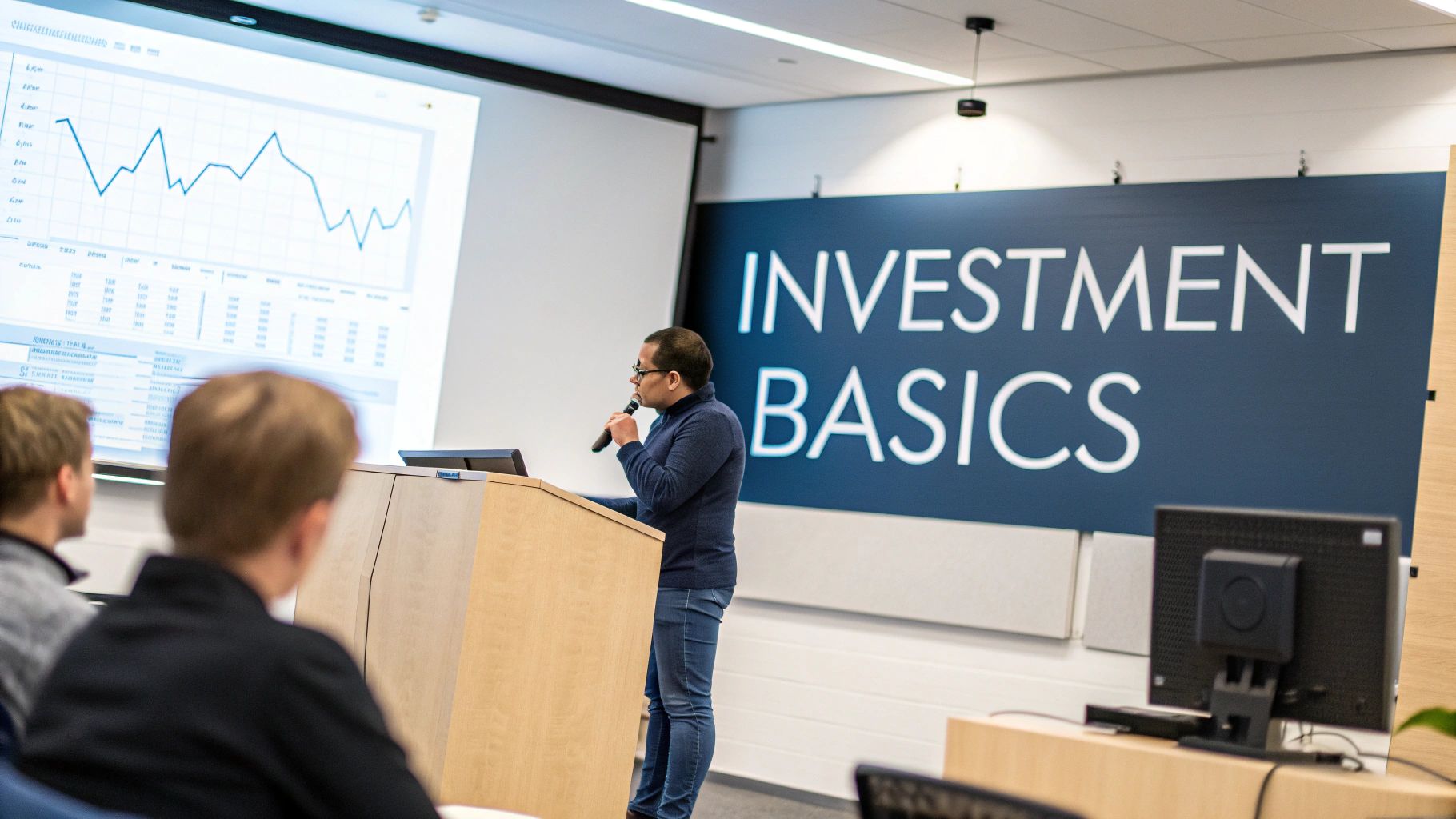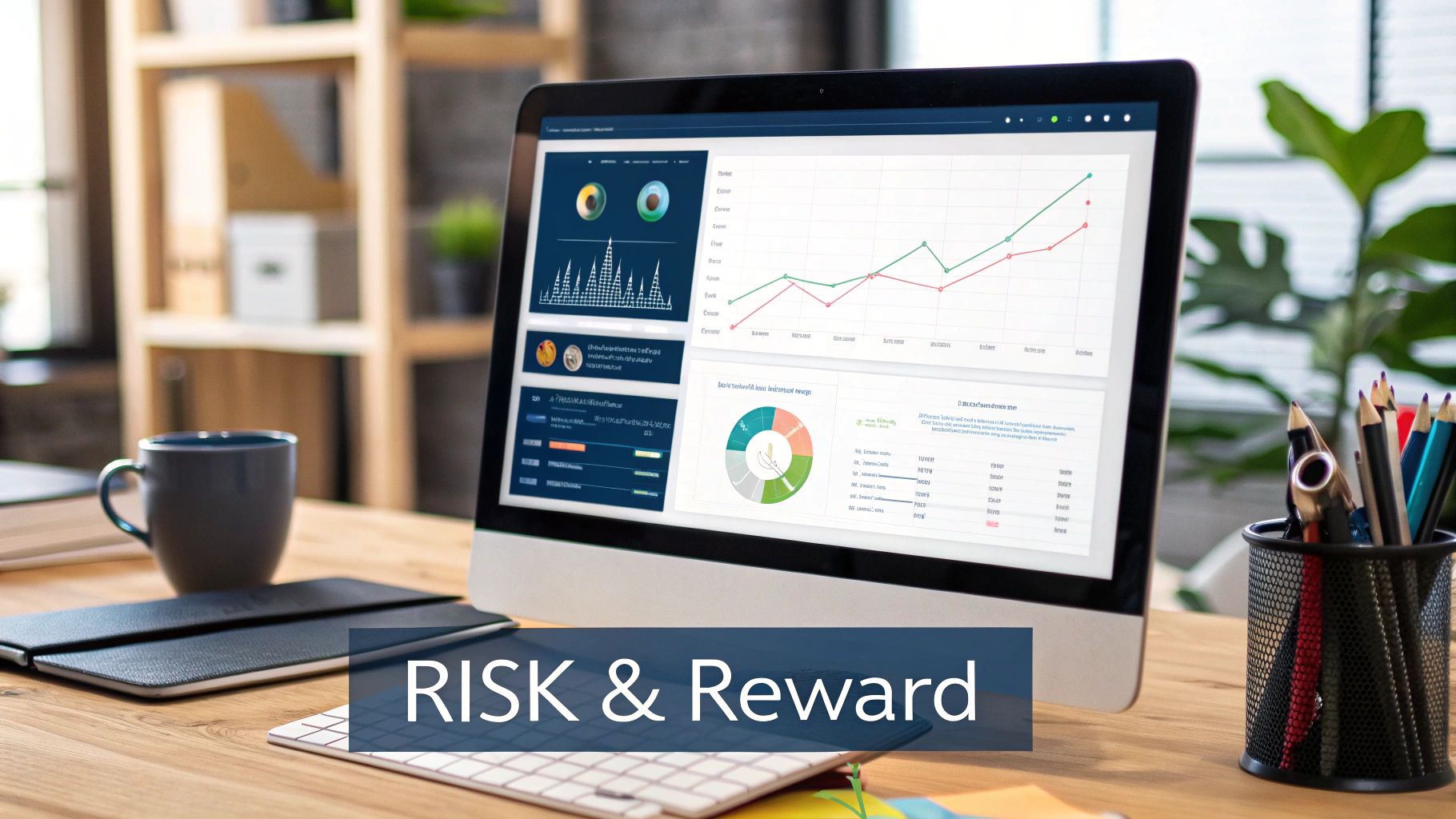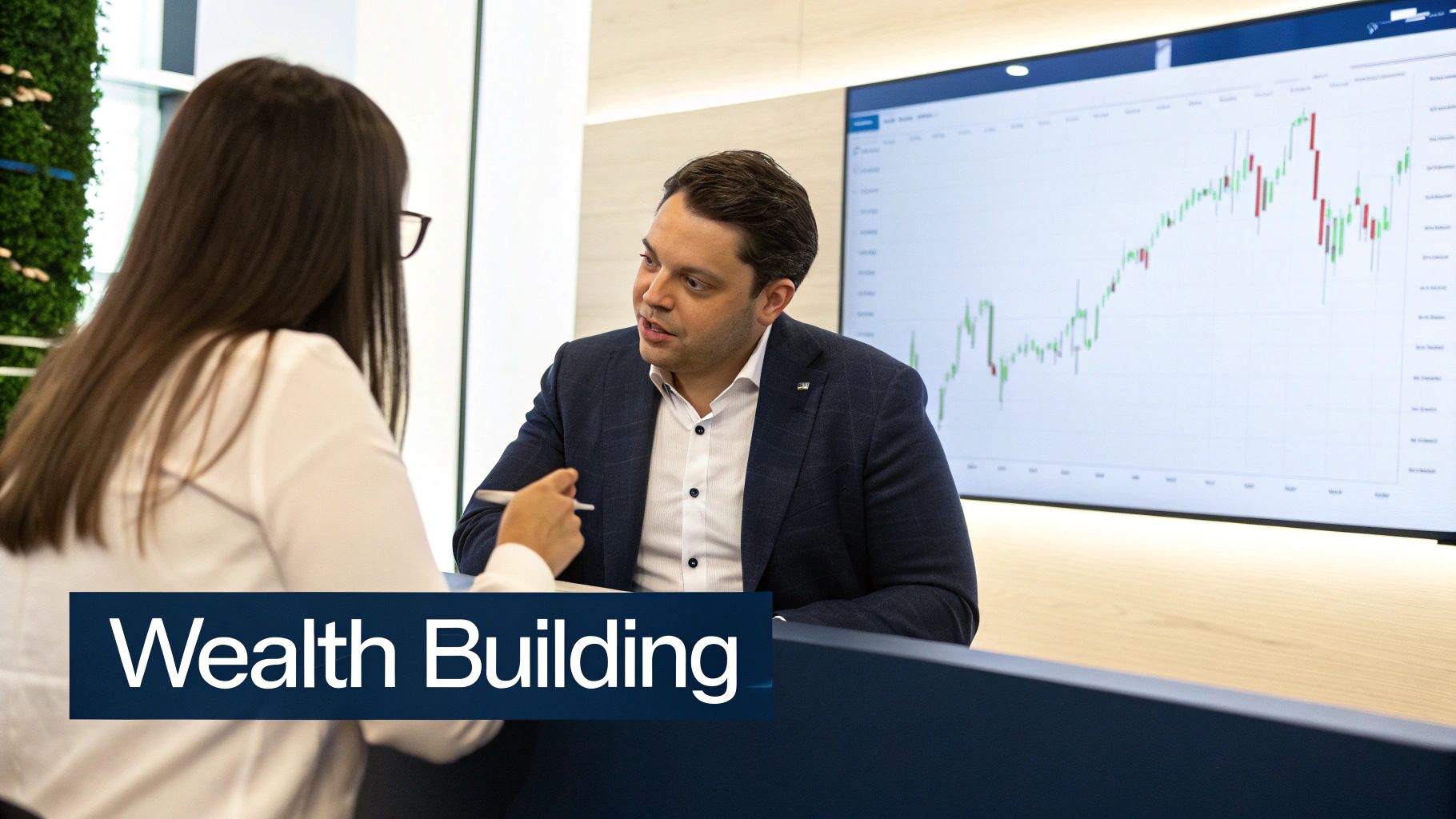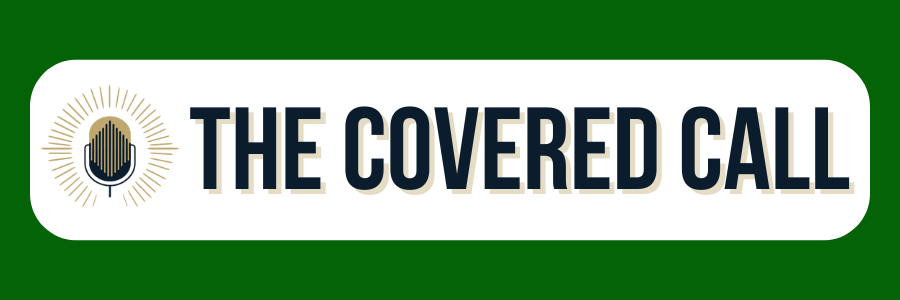Why Alternative Investment Education Matters Now

The financial world is in constant flux. Traditional investment strategies alone may no longer be enough to successfully navigate today's complex markets. This is where alternative investments offer a new path, providing diversification and the potential for stronger returns. However, understanding these investments requires specialized knowledge and a deeper understanding of market dynamics.
The Growing Need for Alternative Investment Expertise
The financial industry is experiencing a surge in demand for professionals with expertise in alternative investments. Institutional investors, including pension funds and endowments, are increasingly allocating capital to alternatives like private equity, real estate, and hedge funds, recognizing their potential to boost portfolio performance. This trend isn't limited to institutions; high-net-worth individuals are also actively seeking alternative investment avenues.
This shift has created a crucial need for alternative investment education. Financial advisors, in particular, are under increasing pressure to effectively guide their clients through this evolving investment environment. The field of alternative investment education itself is also transforming, demanding more robust and comprehensive training programs.
By 2028, financial advisors in the US are projected to have $2.5 trillion allocated to less liquid alternative investment assets. This represents a dramatic increase of nearly 80% from the current $1.4 trillion. This growth underscores the vital importance of educating advisors about the nuances of alternative investments. A majority (77%) of advisors prioritize baseline education at the asset class level. Another 69% seek guidance on portfolio construction, while 54% want training on how to best discuss alternative investments with clients. Interestingly, only 21% of advisors admit to lacking sufficient knowledge about alternative investments, highlighting a potential gap between perceived and actual expertise. For a closer look at these statistics, visit: https://www.investmentnews.com/alternatives/advisors-need-alts-education-but-what-training-do-they-want/256719
Addressing the Knowledge Gap
Overconfidence in understanding alternative investments is a common pitfall for many financial professionals. This can lead to missed opportunities and potentially expose clients to undue risks. A solid educational foundation in alternative investments is critical for several reasons:
Identifying Suitable Investments: A deep understanding of each asset class—including private equity, real estate, hedge funds, and commodities—allows advisors to craft tailored investment strategies that align with individual client needs.
Managing Risk: Alternative investments often carry unique risk profiles. Proper education equips advisors with the tools to effectively assess and mitigate these risks.
Building Client Trust: Demonstrating expertise in alternative investments strengthens the advisor-client relationship. It positions advisors as trusted partners, capable of navigating complex market conditions and achieving optimal results.
This knowledge gap represents both a challenge and a significant opportunity. By investing in alternative investment education, financial professionals can gain a competitive edge and attract discerning clients. Those who embrace this educational journey will be well-prepared to succeed in the evolving world of finance.
Certifications That Actually Move the Needle

The alternative investment world offers numerous certifications. However, their value varies significantly. Selecting the right one is key for career advancement. It's about choosing credentials that boost your knowledge and open doors, not just lengthen your resume.
The Gold Standard: CAIA Charter
The CAIA (Chartered Alternative Investment Analyst) Association is a leader in alternative investment education. Their CAIA Charter is a globally recognized designation. Earning it requires passing two challenging exam levels and having relevant work experience.
Over 13,000 professionals in over 100 countries hold the CAIA Charter. The CAIA Association also offers UniFi by CAIA, a self-paced learning platform. Participants earn certificates in various areas, including alternative investment fundamentals, private debt, and digital assets.
Since April 2022, over 10,000 participants have finished the fundamentals course. It's a valuable framework for understanding alternative investments. Learn more about expanding alternative investment education options: Explore this topic further.
Other Notable Certifications and Programs
Several other valuable certifications and programs exist in the alternative investment field:
- CIPM (Certificate in Investment Performance Measurement): This focuses on performance evaluation and presentation. It's highly respected in investment management.
- CFA (Chartered Financial Analyst): While not exclusively about alternatives, the CFA Institute program includes a considerable amount of content on them, offering a broad base of knowledge.
- CIMA (Certified Investment Management Analyst): This certification covers many investment topics, including alternatives, emphasizing asset allocation and portfolio construction.
The ideal certification depends on your career aspirations and current knowledge.
Emerging Educational Frameworks
Besides traditional certifications, new educational frameworks offer targeted training in specific alternative asset classes. These programs suit professionals seeking deeper niche expertise without pursuing full certification. This focused approach helps them quickly gain practical, applicable knowledge.
For instance, private equity real estate programs offer in-depth training in valuation, deal structuring, and market analysis within that sector. Digital asset courses give specialized instruction on blockchain technology, cryptocurrency markets, and regulations.
To help you compare some of the top choices, we've compiled the following table:
Alternative Investment Certification Comparison: Comparison of leading alternative investment certifications and educational programs.
| Certification | Focus Areas | Time Commitment | Cost | Industry Recognition |
|---|---|---|---|---|
| CAIA Charter | Alternative Investments (broad range) | Typically 18-24 months | ~$2,500 (including exams and membership) | High, globally recognized |
| CIPM | Investment Performance Measurement | Varies, self-study | ~$1,500 - $2,000 | High, especially for performance analysts |
| CFA | Investment Management (includes alternatives) | Typically 3 years | ~$4,000 (including exams and registration) | High, globally recognized |
| CIMA | Investment Management (includes alternatives) | Varies, program dependent | Varies, typically several thousand dollars | High, particularly for wealth managers |
This table highlights the key differences and similarities between some of the most prominent alternative investment certifications. Each offers distinct benefits depending on your specific career goals.
Making the Right Choice
Navigating the certification landscape demands careful thought. Understanding each certification's specific focus and how it aligns with your career goals is essential. Researching the curriculum, exam requirements, and industry recognition of each helps informed decision-making.
Talking with experienced professionals and looking at job postings gives valuable insights into which credentials are most valued in your target field. Investing in alternative investment education is significant in time and resources. Therefore, choosing a certification that genuinely advances your career is crucial.
Following The Money: Market Growth Driving Education

The demand for education in alternative investments is rising, mirroring the significant growth of this market. Capital is flowing in new directions, making it essential for financial professionals to understand these shifts. These changes aren't just market fluctuations; they represent a core shift in investor behavior.
The Shift To Alternatives: Where Is The Money Going?
Investors, both institutional and individual, are increasingly exploring alternative investment strategies. Traditional portfolios no longer meet their evolving needs. They are looking for diversification, potentially higher returns, and a competitive advantage.
High-net-worth individuals and family offices are allocating significant capital to private equity, venture capital, and real estate. Institutions, like pension funds and endowments, are also increasing their allocation to alternatives to manage long-term liabilities and reach their target returns. This shift reflects a growing understanding of the limitations of traditional investments in the current economic climate.
Market Expansion and The Knowledge Gap
The rising popularity of alternative investments fuels the demand for related education. Capital invested in private markets has grown exponentially, from $4.5 trillion in 2012 to $12.4 trillion at the close of 2022. Despite this remarkable expansion, a knowledge gap persists. Only 25% of advisors feel confident in their understanding of alternative investments.
This knowledge gap has created a strong demand for further education, with 95% of advisors expressing interest. The expectation that private markets will outperform public markets is a key driver, with 60% of advisors predicting this trend in the coming year. For more detailed statistics, see the 2023 iCapital Financial Advisor Survey.
Opportunities For Forward-Thinking Advisors
Forward-thinking advisors are proactively pursuing alternative investment education. They understand the increasing importance of alternatives in portfolio management and client services. This enhanced knowledge empowers them to address client needs more effectively, provide insightful advice, and stand out in a competitive field.
With specialized knowledge, advisors can:
- Develop more personalized investment strategies
- Clearly explain the potential benefits and risks of alternative investments
- Cultivate stronger client relationships built on expertise and trust
The growth of alternative investments presents a compelling opportunity for those willing to invest in their education. By acquiring the necessary knowledge and skills, financial professionals can position themselves for success in this evolving market. Continuous learning is crucial to harnessing this growth, improving client outcomes, and building a prosperous future.
Learning Strategies That Match Your Expertise Level

Effective education in alternative investments isn't one-size-fits-all. It requires a personalized strategy, built on your existing knowledge and experience. Think of it like constructing a building: a solid foundation is essential before you can add the upper floors. This tiered approach prevents wasted time rehashing familiar concepts, or getting lost in overly complex material. It's about steady progress, building your understanding step by step.
Foundational Knowledge: Building Your Base
New to alternative investments? Start with the basics. This initial phase isn't about complicated formulas or technical jargon. It's about grasping the core concepts. What are the different types of alternative assets, and what purpose do they serve? How do these investments differ from traditional stocks and bonds? This foundational knowledge provides the necessary structure for more in-depth learning later on.
Intermediate Level: Bridging the Gap
With a strong foundation, you can explore more advanced topics. This intermediate stage emphasizes practical skills, such as due diligence and assessing investment opportunities. You'll also delve into the specifics of different alternative asset classes, from private equity and real estate to hedge funds and commodities. This is where you'll start applying basic principles to real-world situations.
Advanced Expertise: Mastering the Nuances
Advanced education explores the finer points of risk management, performance evaluation, and building a diversified portfolio. You'll investigate specialized investment techniques, complex market structures, and how to manage illiquid assets. The focus here is developing expertise and making informed decisions in changing markets.
To illustrate the progression of learning, let's look at the following framework:
To help illustrate this learning journey, let's explore a framework for understanding alternative investment education. The following table outlines the key learning objectives, recommended resources, and application focus for each expertise level:
Alternative Investment Knowledge Framework Educational needs and focus areas for different expertise levels
| Expertise Level | Key Learning Objectives | Recommended Resources | Application Focus |
|---|---|---|---|
| Foundational | Understanding basic definitions, asset classes, and the role of alternative investments | Introductory texts, online courses, industry overviews | Building a basic understanding of the landscape |
| Intermediate | Developing practical skills in due diligence, valuation, and understanding specific asset class characteristics | Specialized courses, case studies, industry reports | Applying knowledge to analyze investment opportunities |
| Advanced | Mastering risk management, performance analysis, portfolio construction, and advanced investment strategies | Advanced academic papers, industry conferences, expert networks | Making sophisticated investment decisions in complex market environments |
This framework provides a clear roadmap for progressing through alternative investment education. It allows individuals to focus on the most relevant knowledge and skills at each stage of their learning journey.
A well-structured, tiered approach is becoming increasingly vital, especially as alternative investments become more common. Research suggests foundational education should cover alternative investment basics and due diligence. Intermediate learning then tackles costs, fees, and operations, while advanced study emphasizes liquidity and performance risk management. This structure caters to different experience levels, equipping individuals with the tools for successful alternative investing.
Assessing Your Needs and Choosing the Right Path
Honest self-assessment is key. Avoid overestimating your knowledge; it can lead to setbacks and frustration. Pinpoint areas for improvement and find resources aligned with your objectives. These could include online courses, industry events, or personalized mentoring.
Learning in alternative investments is an ongoing journey. Even experienced professionals benefit from continual development. Markets constantly evolve, and staying ahead demands a commitment to expanding your knowledge and honing your skills. A tailored learning strategy empowers you to effectively reach your educational targets and fully leverage the potential of alternative investments.
Digital Resources That Deliver Real Results
The internet offers a massive amount of information on alternative investment education. However, the quality can be spotty. This section helps you separate platforms with actionable insights from those offering just superficial overviews. We'll explore evaluating online educators' credibility, identifying effective interactive learning, and highlighting the benefits of virtual communities.
Evaluating Credibility in the Digital Sphere
Finding credible online resources for alternative investment education is critical. Look for platforms supported by recognized institutions or industry experts. Check the educators' credentials and experience. Do they have a proven track record? Are their materials updated to reflect market shifts? For example, a platform discussing cryptocurrency should have current information on recent regulatory changes. This shows a commitment to accurate, relevant information.
Also, look at user reviews and testimonials. Real experiences from other learners provide valuable insights. However, be mindful that not all reviews are genuine. Seek balanced perspectives from multiple sources to develop a well-rounded opinion. By carefully examining online resources, you can pinpoint credible sources for alternative investment education. This careful evaluation will be essential for successful online learning.
Interactive Learning and Knowledge Retention
Interactive learning methods considerably improve knowledge retention. Actively engaging with material creates deeper understanding than passive consumption. For instance, online platforms with real-world investment simulations let learners apply concepts practically. This hands-on experience reinforces understanding and builds critical-thinking skills.
Moreover, gamification and interactive quizzes can make learning fun and engaging. These elements transform education into an active process, improving knowledge retention. Think of learning a language: flashcards and interactive exercises are far more effective than just reading a grammar book. This active engagement creates lasting knowledge.
Virtual Communities and Knowledge Sharing
Virtual communities are changing how alternative investment professionals connect and share knowledge. Online forums and discussion groups create spaces for learners to interact with peers and experts. They are a valuable opportunity to discuss complex topics, ask questions, and gain diverse perspectives.
These communities can also be powerful networking tools. Consider these forums the digital version of industry conferences. You can connect with like-minded professionals, uncover new opportunities, and stay current on market trends. Furthermore, these communities facilitate knowledge sharing among professionals at different experience levels. Seasoned investors can mentor, while newer members gain valuable guidance and support.
Building Your Customized Digital Learning Path
Creating a personalized digital learning journey is key to maximizing your alternative investment education. Start by assessing your current knowledge and defining your learning goals. What areas need improvement? Which asset classes align with your career aspirations? This self-assessment helps you focus and select appropriate online resources.
Then, explore different platforms and choose those that suit your learning style and objectives. Some prefer structured online courses, while others prefer self-paced learning. Consider factors like content quality, interactive elements, and community engagement. Lastly, create a schedule and stick to it. Consistency is vital for reaching your learning goals. Treat your online learning as a serious commitment. This dedicated approach will help you effectively expand your alternative investment knowledge.
Translating Education Into Client-Winning Expertise
Alternative investment education isn't just about gaining knowledge. It's about turning that knowledge into a powerful tool to attract clients, build trust, and ultimately, achieve greater success. This goes beyond understanding the technical aspects of different asset classes. It means mastering communication, effectively addressing client concerns, and crafting compelling investment narratives.
Communicating Complex Concepts with Clarity
One of the biggest challenges with alternative investments is explaining complex concepts to clients who may not have a strong financial background. This requires clear, concise, and accessible language. Avoid jargon and technical terms that can confuse or intimidate clients.
Instead, use analogies and real-world examples to illustrate key points. For example, comparing the illiquidity of private equity to owning a small business can help clients understand the concept more easily. The goal is to empower clients with the knowledge they need to make informed decisions.
Addressing Client Concerns and Objections
Clients often have concerns about alternative investments, especially regarding liquidity and risk. Be prepared to address these concerns directly with thoughtful, strategic responses. Acknowledge their concerns and offer solutions that mitigate potential risks.
This might involve structuring portfolios with a mix of liquid and illiquid assets. Or, it could involve showing how alternative investments can improve diversification and potentially reduce overall portfolio volatility. Successfully navigating these conversations builds client confidence and strengthens your role as a trusted advisor.
Building Compelling Investment Narratives
A compelling investment narrative is essential for setting your practice apart and attracting high-net-worth clients. This involves more than just presenting data and performance metrics. It requires telling a story that connects with the client's individual goals and aspirations.
Explain how alternative investments can help them achieve their long-term financial objectives. Whether it's a secure retirement, funding their children's education, or leaving a lasting legacy, a personalized approach differentiates you from advisors who only focus on the numbers.
Real-World Applications: Turning Knowledge into Action
The real value of alternative investment education lies in its practical application. Learning from successful advisors offers invaluable insights. How have they used their knowledge to attract new clients? What strategies have they used to retain existing clients and build stronger relationships?
Examining real-world case studies provides concrete examples of how to turn education into results. This lets you learn from the best and use proven strategies in your own practice. Ultimately, building a thriving practice takes more than just knowledge; it requires mastering client engagement and delivering superior results.
Unlock your full potential as a financial advisor. Subscribe to The Covered Call Podcast and gain valuable insights from successful entrepreneurs and investors. Learn how they've used alternative investments to achieve financial freedom and create a life of purpose and fulfillment.

